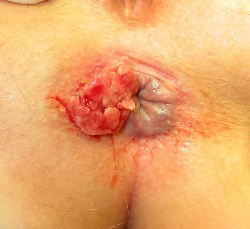Patients with anal cancer often mistakenly think that the rectal symptoms are caused by hemorrhoids, which lead to a significantly delayed diagnosis. Even when patients seek medical attention, anal cancer is often misdiagnosed as hemorrhoids. It is important to have a high suspicion of anal cancer if patients have rectal symptoms.
 Anal cancer is account for 2% of cancer in the gastrointestinal tract. It usually refers to anal squamous cell carcinoma. Anal squamous cell carcinoma is a disease associated with human papillomavirus (HPV). The anal cancer develops from the inflammation of squamous cells in the anal canal, which is the space that connects the rectum to the outside of the body. This is inflammation is often believed to be caused by HPV. Squamous cell cancer makes up the majority of cases of anal cancer- about 80%. Cancer types other than squamous cell carcinoma are varied and rare, accounting for only a minority of anal cancer.
Anal cancer is account for 2% of cancer in the gastrointestinal tract. It usually refers to anal squamous cell carcinoma. Anal squamous cell carcinoma is a disease associated with human papillomavirus (HPV). The anal cancer develops from the inflammation of squamous cells in the anal canal, which is the space that connects the rectum to the outside of the body. This is inflammation is often believed to be caused by HPV. Squamous cell cancer makes up the majority of cases of anal cancer- about 80%. Cancer types other than squamous cell carcinoma are varied and rare, accounting for only a minority of anal cancer.
Symptoms
Anal or rectal cancer generally do not produce any pain; an external or internal mass may be palpable. Some lesions are so soft that they are missed on palpation. Common symptoms include anal/pelvic pain and anal bleeding (seen in about half of patients), sensation of a mass in the rectum (seen in about a third of patients), local sensations of wetness/irritation, prolaps, rectal incontinence, and severe constipation.
About 19% of patients wait 6 months to see a doctor after initial symptoms. To further complicate things, about 27% of patients end up initially receiving treatment for misdiagnosed anorectal diseases with similar symptoms like hemorrhoids. Anal cancer has a very long lag time between symptoms and diagnosis due to reluctance or denial, often out of shame/embarrassment, or fear.
Risk factors for anal cancer include active HPV infection, smoking, receiving anal sex, immunosuppression, HIV infection, and organ transplant. Risk is particularly high if one has two or more of these factors.
Treatment
Surgery plays a limited role in the treatment for anal cancer. Surgery is indicated in anal cancer with very early stage, such as T1, N0, well-differentiated lesions in the anal margin.
For the majority of patients diagnosed with anal squamous cell carcinoma, treatment will consist of radiation therapy combined with radiosensitizing chemotherapeutic agents. These treatments can caused the complications that affect the anal cancer patient, including the short-term adverse effects of chemotherapy and long-term risks of radiation exposure.
Conservative management of symptoms include lifestyle changes and bulking agents and anti-diarrheal agents.
Vaccination against HPV serotypes 16 and 18, which are believed to cause the majority of cases, is the best way to prevent the development of anal cancer.




